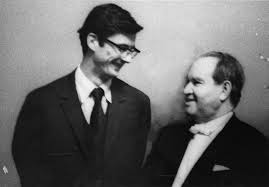
What better way to end the year than with a few rare old recordings by the legendary Russian violinist David Oistrakh (1908-1974)? Listening to these clips, which range from solo to chamber repertoire, it’s easy to hear why Oistrakh is regarded as one of the greatest violinists of all time. There is a deep musical sincerity and a powerful sense of humanity in his playing which transcends the ordinary. In the fastest and most demanding technical passages every note sings with the most round, noble tone. Even now, his playing sounds strangely “modern,” uninfected with stylish mannerisms of any historical period. It’s just pure music.
My former teacher, Oleh Krysa, was a student of Oistrakh for seven years. In Book 14 of The Way They Play, Krysa sheds some light on the qualities which set Oistrakh apart as a performer and teacher:
[quote]In the first place, it was about developing musical sincerity, which is probably of utmost importance. He was absolutely intolerant of certain things: it refers primarily to ethics and taste and as a consequence to such aspects as style of playing, choice of repertory, attitude not only to music, but to art in general…Harmony was really striking in him-I mean both his human charm and performance. Oistrakh’s creative work, at least for me, associates with Raphael’s paintings. In his playing there had never been any pointedness of expression or sugary sentimentalism, there had never been a trace of affectation aimed at winning over the public. And his pedagogical activities were also aimed first and foremost at guarding his pupils against such “extremes” and at teaching them to express themselves naturally and sincerely on the instrument.[/quote]
[typography font=”Cantarell” size=”28″ size_format=”px”]Violin Concerto[/typography]
Here is Oistrakh’s 1962 recording of the Tchaikovsky Concerto with Eugene Ormandy and the Philadelphia Orchestra. The warm, rich Philadelphia string sound is on full display in this recording. Oistrakh chose to perform his own edition which is closer to Tchaikovsky’s original text than the edition by Leopold Auer. Tchaikovsky originally dedicated the concerto to Auer but withdrew the dedication after Auer’s criticism. The first performance was given by Adolf Brodsky in Vienna in 1881.
[ordered_list style=”decimal”]
[/ordered_list]
[button link=”https://itunes.apple.com/us/album/tchaikovsky-piano-concerto/id404884325″]Find on iTunes[/button] [button link=”http://www.amazon.com/Tchaikovsky-Piano-Concerto-No-Violin/dp/B00000276V”]Find on Amazon[/button]
[typography font=”Cantarell” size=”28″ size_format=”px”]Piano Trio, Op. 50[/typography]
Now let’s hear a 1948 recording of Tchaikovsky’s Piano Trio in A minor, Op. 50. Oistrakh is joined by pianist Lev Oborin and cellist Sviatoslav Knushevitsky.
Written around 1881, the piece is in two large movements. In the second movement a series of contrasting and far reaching variations (including a fugue) spring from a simple melody. Tchaikovsky worried that it was too symphonic, writing to a friend:
[quote]The Trio is finished … now I can say with some conviction that my work is not all bad. But I am afraid, having written all my life for orchestra, and only taken late in life to chamber music, I may have failed to adapt the instrumental combinations to my musical thoughts. In short, I fear I may have arranged music of a symphonic character as a trio, instead of writing directly for the instruments. I have tried to avoid this, but I am not sure whether I have been successful.[/quote]
Symphonic or not, the music embodies a sense of raw emotion unique to Tchaikovsky. In the heroic major section between 2:55 and 3:41 it’s hard not to hear a hint of Russian nationalism.
[ordered_list style=”decimal”]
- Pezzo elegiaco (Moderato assai – Allegro giusto) 0:00
- (A) Tema con variazioni: Andante con moto – (B) Variazione Finale e coda 18:00
[/ordered_list]
Despite its many spirited adventures, the music seems to give up at the end with the same tragic acceptance we hear at the end of the “Pathetique” Symphony. Tchaikovsky builds our anticipation around 44:35 by prolonging the dominant (V chord), but listen to way he avoids a clear, satisfying resolution at 45:08. The remaining music melts away into the gloomy hopelessness of a funeral dirge.
[button link=”https://itunes.apple.com/us/album/dvorak-violin-concerto-in/id271396502″]Find on iTunes[/button] [button link=”http://www.amazon.com/Oistrakh-Plays-Russian-Piano-Trios/dp/B008L62Y4K”]Find on Amazon[/button]
[typography font=”Cantarell” size=”28″ size_format=”px”]Sérénade mélancolique, Op. 26[/typography]
Here is a 1948 recording of the hauntingly beautiful Sérénade mélancolique. Notice all the little Tchaikovsky-isms: the structure of the melody and the way it restlessly develops, the off-kilter rhythmic complexity in the low strings around 3:45, the counter melody scale line (beginning at 6:28) which begins in the low woodwinds and rises dramatically, passing from one instrument to another. Around 8:05 this passage comes again with the violin and woodwinds reversing roles. Listen to the bass pizzicatos providing a rhythmic foundation under the melody. Tchaikovsky is never far from the world of ballet.
https://www.youtube.com/watch?v=A9E2CFuCvNI
[typography font=”Cantarell” size=”28″ size_format=”px”]Andante Cantabile[/typography]
Here is the second movement of Tchaikovsky’s String Quartet in D Major, Op. 11. The melody is based on a Russian folk song which Tchaikovsky apparently heard whistled by a house painter. Oistrakh performs with Pyotr Bondarenko, Mikhail Terian and Sviatoslav Knushevitsky.
Yehudi Menuhin on David Oistrakh (Great Masters of the Violin, Boris Schwartz):
[quote]I loved him immediately. Not only was he the gentlest, staunchest, most warm-hearted of men, but he was also simple and ingenuous. He never felt the need to appear other than he was…but presented himself candidly, without second thoughts or self-consciousness or doubts about his reception, a complete human being.[/quote]
